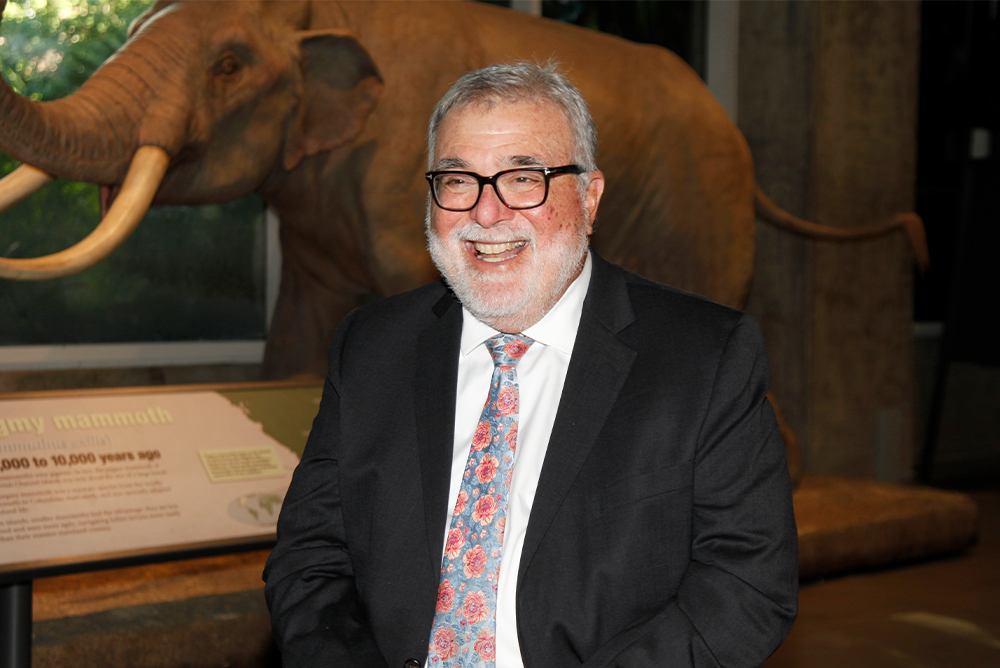
Photo by Aaron Salcido.
B. Scott Silverman is a former judge for the Superior Court of Los Angeles County and currently practices as a mediator, private judge, and arbitrator. Before taking part in “How Can Our Communities Escape Polarizing Conflict?,” a Zócalo/California Wellness Foundation event, co-presented with the Natural History Museum of Los Angeles County, Silverman joined us in our green room at the La Brea Tar Pits and Museum to talk 1900s Fresno, why he’d get rid of cars in Los Angeles, and the first conflict he mediated.
Your tie is fantastic. Does it have a backstory?
I bought this in Florence, Italy. It’s one of my favorite ties. [My wife] and I were walking down the street in central Florence. This was sitting there in the window of a shop.
Speaking of travel, where’s the place you most want to go in the world?
Vietnam—the history, the culture … I spent a year living in Indonesia 50 years ago, and I haven’t been back to Southeast Asia since and I’ve had lots of people tell me it’s an interesting place to go to. And frankly, I’d love to see some of the places whose names played such a role in my life when I was in college that are now very different. So I’m gonna try and plan a trip next year.
What’s the first conflict you remember mediating?
The question is, what does that mean? Because while I was a judge, I spent two years as the settlement officer for the court—that’s essentially being a mediator. And to be honest with you, there were four a day for two years. So, it’s hard to distinguish one from the other.
What’s the last book that you loved?
Well, I’m reading right now Conundrum by Jan Morris, which is her story of her transition. I love her language, her languages. She’s a little wordy, but her perception of her gender, and her sexuality are really interesting and novel. Very different than my personal experience. So I’m doing it for a book group, but it’s a wonderful book.
If you could time travel, where is one place would you go and why?
I’d like to go back to my hometown of Fresno in about 1905 because I wrote a thesis once in college about the politics of the community at the time, and the conflict between the sort of bonafide Democrats, the corrupt ward heelers, and the efforts to sort of clean up government at the time was fascinating.
What is it about California that has kept you anchored here?
Each step of my life, my decision was: That’s the place I would rather be. Obviously, I grew up in Fresno, and it’s where my parents were, and then I went off to Stanford because where else do you want to go to college in 1967? And then after I went and spent a year in Indonesia, and came back here to go to law school, it crossed my mind to go someplace else. But living in the Bay Area, with the life and politics and the people who were there, just seemed like where I ought to be. And so that’s where I lived. My son currently lives in Brooklyn. I love to go see Brooklyn but it’s unimaginable to me to live in that kind of an urban environment. I sort of consider Los Angeles a collection of villages. And I enjoy that.
If there’s one person that you could meet, who would it be and why?
There’s a collection of great judges that I would like to have known. I’d love to spend time sitting in Ruth Bader Ginsburg’s chambers as she did her work. I had the good fortune to work for a judge on the California Supreme Court when I got out of law school and just sitting around watching very honorable people do very honorable work was thrilling for me. I’d love to go watch Ketanji Brown Jackson, join the court and see how she performs. I thought her performance in that horrendous hearing was the model of what judges should be: incredibly patient forthright to the extent it is appropriate to be forthright, and firm about who she was.
What’s one unpopular opinion that you have?
I’m not a very controversial person. I’d like to get rid of most automobiles in Los Angeles. I own an electric bike. And I’d be perfectly satisfied if we limited Olympic Boulevard, Pico Boulevard, Wilshire Boulevard to bicycles. I’m not sure that’s all that popular among a certain segment of the population! I’ve discovered with this bike that I can get within 15 miles of West L.A., where I live, anywhere and get back in a convenient amount of time and I’d just as soon live that way.



